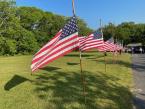From the Vineyard Gazette edition of June 2, 1921:
There was never a fairer Memorial Day than Monday when Vineyard Haven stirred to music now martial, now solemn on the clear air, and stood with bared head to do reverence to veterans of old wars and of new.
Assembling in front of the Methodist Church, the line of march wound to the cemetery. Leading was the Vineyard Haven Band under Henry J. Cleveland. Then came the two survivors of the Grand Army, Mr. Luce and Mr. Castello, driven by Mrs. Whittemore, Regent of Sea Coast Defense Chapter, D.A.R.
Tisbury Post of the American Legion was next in line making an impressive showing in every way and by its turn-out making the Memorial Day something full of meaning.
There followed town officials and the clergy wearing poppies upon their coats. The Relief Corps, Woman’s Auxiliary, Girl Scouts, teachers and pupils followed in line. For a young organization the girl scouts showed themselves full of spirit and up to a first class appearance in public. They did extremely well in every way. They were led by Mrs. Hariph Hancock, Commissioner, Mrs. Donald Tilton, Captain, and Miss Dorris Hough, visiting director and member of the council.
The exercises in the cemetery where the procession drew up in formation, were impressive. Oak Grove cemetery is always beautiful, but it seems particularly favored in the spring. Amid the natural beauty of the green trees and hedges and the flowers here and there, onlookers stood with uncovered heads while the band played and a little later Rev. J.H. Graham offered prayer.
Mrs. Sydna Eldridge as head of the Woman’s Relief Corps and “mother” of the Tisbury Post of the American Legion, was the ranking officer present and ably directed the patriotic exercises.
When the wreaths had been laid upon the graves of heroes dead, Hariph Hancock played taps.
The line formed again and marched to the accustomed place for the Relief Corps’ service in memory of the unknown dead. The ritual, rarely beautiful, was impressively rendered.
The procession then wound out of the cemetery and through the town before it was dismissed.
On Friday last following the memorial service by pupils of the schools, flowers were cast from the wharf in memory of those who sleep beneath the waves.
On Sunday a union memorial service was held in the Methodist Church. Mr. Alger was the speaker of the evening.
Edgartown was self-decorated for its impressive memorial exercises. Its leafy lanes, its flowering vines and shrubs, its sparkling water, and its fragrant summer air, formed a perfect setting for the parade, gay with blossoms and flags which passed down its principal streets Monday morning.
Very soon after 9 o’clock, the scheduled hour, the parade was underway, starting from the courthouse, proceeding to the wharf, by way of Main and North Water street, and winding its way back to the cemetery. In the lone of march were: Edgartown Band, splendid in new uniforms, Richard G. Shute, veteran, and leader, as slim and straight as a boy, wielding his baton in the most approved fashion; Civil War veterans, including Beriah T. Hilman, marshal of the parade; the Relief Corps, headed by Miss Hattie L. Shute, president; American Legion; Spanish War Veterans; Woman’s Auxiliary to Legion; Sons of the American Revolution; D.A.R.; Red Men; Pocahontas; teachers and school children.
The children must have had a hundred per cent attendance and a dainty picture they made, in white dresses, each carrying bouquets of white and purple flowers.
At the wharf, the ever impressive ritual of the W.R.C. was read, with prayer by Rev. Irving W. Coombs, himself a veteran, and then the children stepped forward one by one and threw into the sunlit waters of the bay, flowers in remembrance of the dead who sleep beneath the waves.
The line of march was comfortably filled with spectators, most of whom accompanied the procession to the cemetery where the graves were decorated by members of the American Legion, assisted by school boys and girls. There were simple but effective services at the cemetery after which the parade disbanded.
Monday night there was a good attendance at the Town Hall where Earic D. Wilson of New Bedford recited several poems by Robert W. Service. He preceded his frequently encored readings by a brief talk on the need of perpetuating Memorial Day.
The night before at the union service held at the Town Hall, hundreds heard Rev. Howard P. Davis in an inspiring talk on “Some National Dangers.” He took as his text “the arrow that flieth by day.” Tracing the growth of this country and its commanding position today, he pointed out some of the dangers which beset it now, and warned against the present generation’s forgetting the lessons learned by our forefathers.
library@mvgazette.com
Compiled by Hilary Wall
library@mvgazette.com






Comments (1)
Comments
Comment policy »